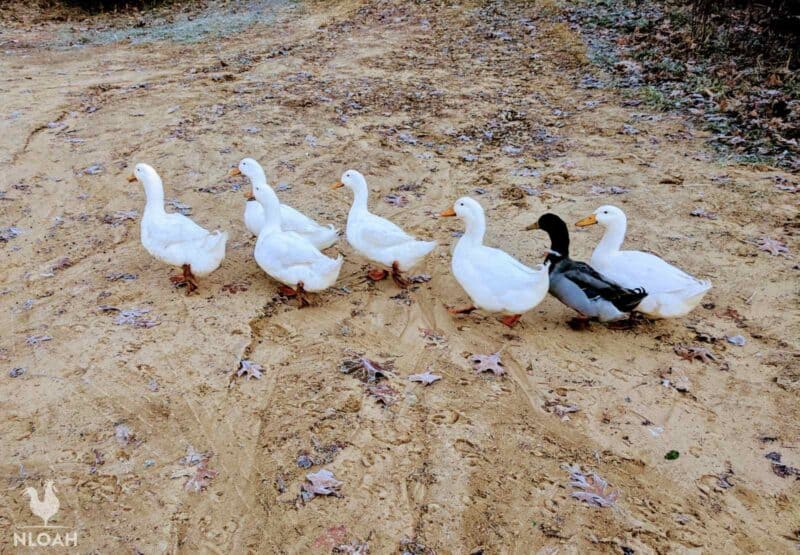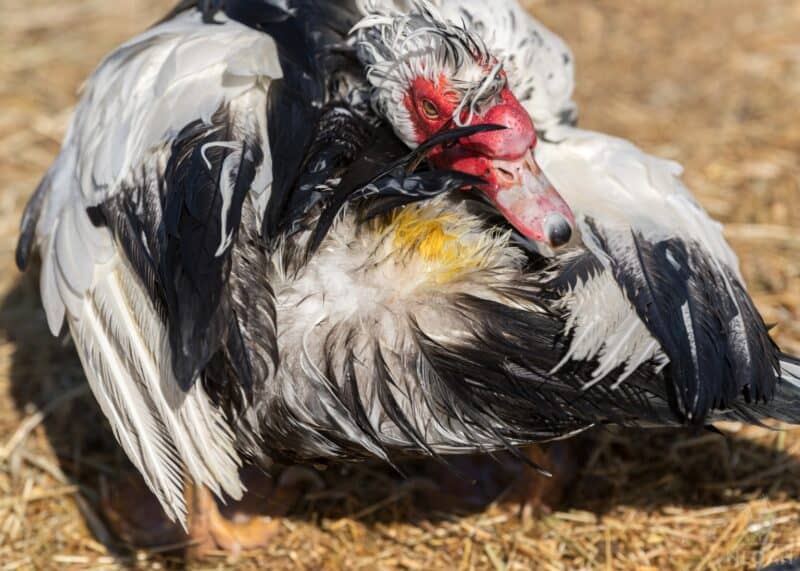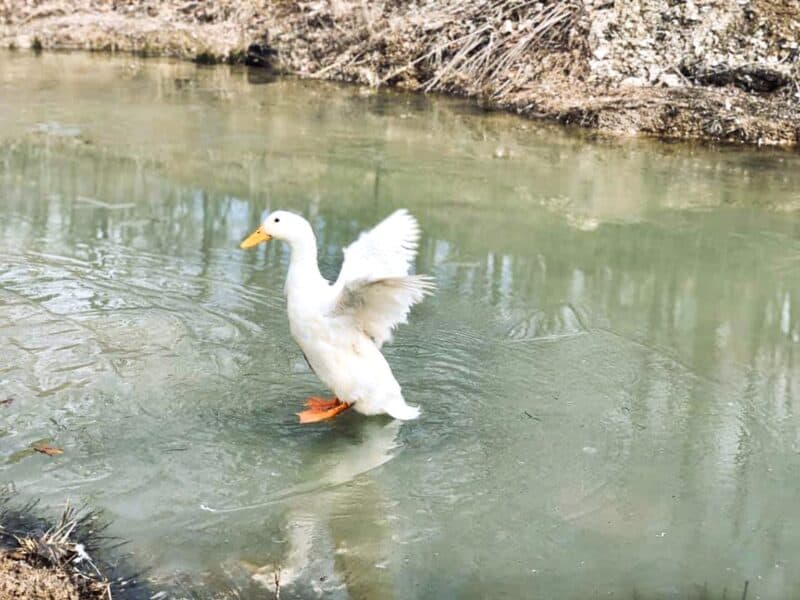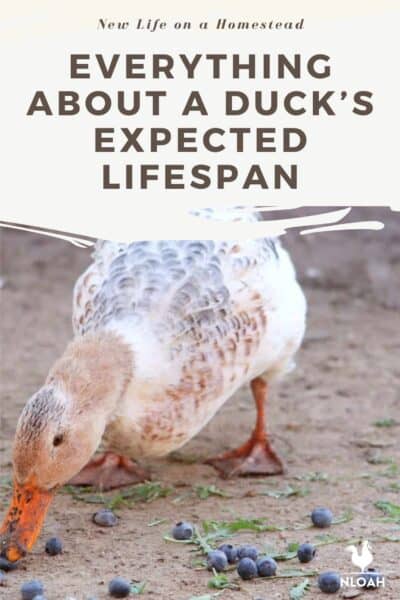If you love and care about animals, it’s heartbreaking to imagine life without them. Once you invest your blood, sweat, and tears into raising them and caring for them, they can start to feel like a real part of you. But, sadly, death is a part of all life on Earth, for humans and animals alike. That, naturally, includes our precious ducks.

Understanding how long your ducks can be expected to live is important for managing your flock and also so you can be better prepared for the end-of-life decisions that inevitably come.
No one wants to go through losing a duck that you’ve raised from a duckling, but if you notice them starting to slow down and their health declining, it’s important to assess how much meaningful time they might have left.
To help you deal with this challenging and troubling subject I’m bringing you a guide today that will tell you everything you should know about the expected lifespans of ducks.
Do Some Ducks Live Longer than Others?
Yes, of course. All ducks are individuals to a degree, and some just won’t live as long as othersof the same breed. Others will live longer than they “should”! But breed differences in expected lifespan are real, and some breeds are known for being much longer-lived than others.
We’ll talk much more about that in a few sections, but by way of a for instance Pekins are known for having relatively short lifespans, averaging around 5 to 8 years.
Nonetheless, plenty of owners have reported their well-cared for Pekins living upwards of 15 years! Likewise, some ducks that are known for longer lives like Cayugas might die much younger than you expect, and seemingly for no reason.
That’s just life, and something you should be prepared for!
Do Wild or Domestic Ducks Live Longer?
In almost every set of circumstances, domestic ducks. This is a rule of thumb you can definitely count on.
Even the most neglected domestic birds enjoy better safety, nutrition, and care compared to wild ducks which are forced to subsist on their wits and fitness no matter what the conditions are like.
Wild ducks must contend with injuries, predation, infection, various illnesses, parasites, lack of food, harsh weather, and in general a very high-impact lifestyle compared to their pampered and kept cousins.
Accordingly, by the standards of any given breed, wild ducks usually only have about a quarter of the lifespan with most living only one to three years in the wild.
Do Wild Ducks Usually Die of Natural Causes?
It depends on what you call natural. If crippling infection, devastating injury, or being torn apart by a predator and eaten is considered natural causes then yes, most of them die of natural causes.
They’re not simply getting old and die of senescence like you might be thinking, i.e., dying just because they are tired or absolutely exhausted.
Wild ducks don’t have a happy life, most of the time.
How Long Do Domestic Ducks Live on Average?
The broad average lifespan for domestic ducks is around 8 to 10 years, but as mentioned above, 8 to 15 years old is a safe bet taking into account normal breed variations and it’s hardly unheard of for ducks to live beyond that when in captivity and cared for.
This assumes, naturally, that a duck is not slaughtered for meat or other products. In that case, birds raised for that purpose will rarely live beyond a few months and even then, almost never longer than 6 or 8 months. As soon as they’re fit for slaughter, they are harvested.

How Long Do Pet Ducks Live?
Potentially a very long time, and usually much closer to the maximum lifespan expected of the breed. This could be 15 to 20 years or even longer!
To make the distinction, a pet duck is not exactly the same thing as a common domestic duck. Domestic ducks are usually raised for a purpose whereas a pet duck is a cherished and prized animal companion.
Most domestic ducks are given good care by their keepers, but devoted owners will pull out all the stops for a true pet, giving them the very best food, supplements, meds, and veterinary care that they can afford and taking exacting pains to protect their precious friend from injury and illness.
This, obviously, translates into a much longer lifespan statistically.
Factors Affecting a Duck’s Lifespan
Like every other animal, many factors affect these birds’ lifespans. Some of the most important ones are below.
Genetics: This is something you don’t have much control over. Genetics, as always, plays a huge role in determining lifespan. Some ducks simply aren’t intended to live that long whereas others might have an extraordinarily long life, even by the standards of their breed.
Ducklings born from two healthy and exemplary parents tend to live longer, whereas ones born from parents that have genetic issues of their own and health problems will tend to die sooner.
This is why it’s so important that you consult with a reputable hatchery or breeder to make sure your ducks come from protected and well-developed lineages.
Environment: Ducks that are forced to put up with harsh conditions without the benefit of shelter will not live as long, all other things being equal.
Yes, ducks are incredibly, unbelievably resilient to cold and wet but they aren’t immune to its effects. Likewise, a dirty, filthy environment will affect the overall health and subsequently the lifespan of these birds.
Providing them with adequate shelter and keeping their living spaces clean will go a long way toward maximizing lifespan.
Nutrition: Nutrition is a major factor for the longevity of a duck. Ducks need the right amount of calories and plenty of nutrients at all phases of life in order to thrive. If they’re forced to live with a calorie deficit, they’ll lose weight and generally not be as vital.
A lack of one or more essential nutrients will invariably result in developmental problems, disease, and other issues that can reduce the time they have on earth, or even kill them outright!
Stress: Domestic ducks have it a lot easier than wild ones, but stress is still a factor. If they’re kept in a frightening environment, subjected to loud noises, sudden movements, overcrowding, or excessive mating attempts, the toll will usually be paid in lifetime.
Your ducks don’t need total tranquility, but if they are living under duress most of the time they aren’t going to live as long.
Social Factors: Ducks are social animals and must have the presence of other ducks in order to lead a long life. As much as they might like you and bond with you, you are not a replacement for their fellow birds.
For this reason, the absolute minimum number of ducks you should get is two, and three is better. Better than that is a small flock of five or six.
Medical Care: Just like every other animal we might care for, our ducks need vaccines, checkups, and expert care from trained veterinarians. If they get sick, they should be tended to. If they are injured, get them tended to.
Make sure you get them vaccinated against preventable diseases to reduce instances of death and life-altering conditions. If you want to let fate decide, you can be certain that your ducks will die much sooner.
Predation: I know it’s terrible to think about, but you’ve got to keep in mind that ducks are dinner for a whole lot of meat-eating animals. Large birds of prey like eagles and owls, foxes, dogs, coyotes, larger felines, badgers, and a whole lot more would love nothing more than to pick off a duck and dig in.
If you don’t keep them safe, it’s only a matter of time especially if you are living in an area with a high population density of predators.
Even if your duck gets lucky and survives the attack, the resulting injuries might leave them maimed and seriously reduce their lifespan.

Domestic Duck Lifespans by Breed
Expected lifespan can be very different from breed to breed. You’ll want to understand what you are in for before getting a flock to call your own, or adding a new duck to an existing flock.
Check out the stats and info below, but do keep in mind that sometimes ducks can surprise you like I said! Individual genetics and different lines mean they might enjoy a longer lifespan or suffer from a much shorter one.
Pekin: 5-12 years, though many Pekins have a much shorter average lifespan of 5 to 8 years. These are big ducks that have been relentlessly selected for fast growth and that has often translated into a significantly shorter lifespan compared to other domestic breeds.
Jumbo Pekin: A strain of Pekins, above, not a distinct breed. Bred for immense size, often clearing 12 pounds in the case of drakes, they tend to have more health problems than other ducks and often don’t live as long. Consider 5 to 8 years the standard, with 10 being possible.
Muscovy: 10-15 years. Muscovies are remarkably healthy ducks and tend to live a long time. However, it is worth mentioning that there are some lineages out there that don’t have a particularly long lifespan, averaging anywhere from 8 to 10 years at best.
If you’re interested in Muscovies, consider getting them from a reputable hatchery or breeder and ask about as to the expected lifespan of your birds.
Mallards: 5-15 years. Domestic Mallards have a lifespan that seems random at times, with owners reporting that they either die young or live for a very long time.
Khaki Campbell: 10-12+ years. Khaki Campbells are egg-laying machines and have a reputation for being a little nervous and neurotic.
That said, they tend to be quite healthy and enjoy good vitality, and live for a good, long time. Expect them to be around for 10 years at least with good care, but don’t be surprised if they live well on into their teenage years.
Call Ducks: 7-10 years. Calls are tiny, cute bantam ducks that are known for being extremely noisy and also being super adorable pets. They have a modest lifespan of 7 to 10 years on average, but there are many reports of calls living well into their teenage years also.
Indian Runner: 8-12 years. Indian Runners have a borderline comical appearance thanks to their upright, penguin-like body shape. And they really do run around all over the place.
All that exercise does not give them a much longer life on average, though, they tend to live about 8 to 12 years. In the wild, Indian Runners are notably short-lived with most living only a couple of years at most.
Rouens: 5-9 years. A big, heavy, and impressive heritage breed, Rouens are gorgeous and important domestic ducks but sadly they don’t have a very long life typically, at least in the case of the variety that is raised for meat.
7 or 8 years is about average, and to live 9 years at most. The slower-growing show or fancy breed tends to live significantly longer, though.
Cayugas: 12-15 years. These gorgeous and iridescent green and black ducks are unmistakable and beautiful, and extremely popular as pets and in backyard flocks for that reason. They’ll be with you for quite a while, commonly living to be 13 years old or older.
Wood Ducks: Up to 15 years. Wood ducks are another breed that is particularly robust and healthy. In captivity, with proper care, they can live to be 15 old years or even beyond that in some situations.
Black East Indies: Up to 15 years. A popular domestic breed, these ducks are remarkably good breeders and mothers. They can grow your flock quickly, but be ready because they can live quite a long time!
Blue Swedish: 10-13 years. The Blue Swedish is a rare domestic breed in the United States, but has significant appeal for its good health and personality. As a pet duck they are excellent, and have a modestly long lifespan.
What is the Longest Lived Duck Breed?
Likely a toss-up between Mallards and Cayugas on average. There are several anecdotal examples of each living beyond 20 in captivity.
Which Breed Has the Shortest Lifespan?
Typically, the Pekin. As mentioned above, Pekins have undergone extensive selective breeding to maximize size and growth rate, a combination that tends to drastically reduce lifespan. There are plenty of caring and diligent owners who report these ducks only live about 5 to 6 years.
What is the Longest a Duck Can Possibly Live?
Astonishingly, nearly 50 years old. There are confirmed reports via the Guinness Book of World Records that have established at least one duck living in captivity at the ripe old age of 49. This unknown duck was in the care of Gladys Blackbeard of South Africa. Check it out for yourself!
What Happens as Ducks Get Older?
When ducks get older, they start to go through many of the same challenges that people do.
That being said, don’t look for gray feathers or anything like that as most ducks maintain bright and tidy plumage until they are very close to death. In the case of drakes, you might notice their tail feathers starting to lose that curl and flatten out a bit, but that’s it.
Drakes also have it much easier than females when it comes to a long life and that’s because their body is not ravaged by the demands of egg production and laying. Drakes tend to stay healthier and freer of disease as they move into their golden years.
And, as expected, hens will usually only lay eggs at a high rate for the first five, maybe six years of their life, and sometimes not even that. Egg output will dwindle and, eventually, cease altogether as they get older. She only has so many eggs in the carton!

Tom has lived and worked on farms and homesteads from the Carolinas to Kentucky and beyond. He is passionate about helping people prepare for tough times by embracing lifestyles of self-sufficiency.
